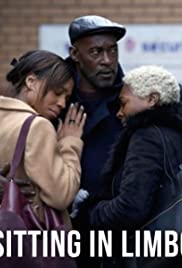
SITTING IN LIMBO
UK, 2019, 89 minutes, Colour.
Patrick Robinson, Nadine Marshall.
Directed by Stella Corradi.
Sitting in Limbo is a television film from Britain, 2020. While the film focuses on actual situations in the 2010s, it has a universal message and can be recommended viewing. In fact, this is the kind of material that has stirred directors, especially Ken Loach, for over 50 years, a drama that he might like to have directed, social injustice, oppressive bureaucracy, human anguish.
The background of the film is the policy in the 1950s and 60s to bring migrants to the UK, citizens of former colonies, from the diminishing Empire. These migrants settled over the years, the children generation who came living in the UK for half a century, identifying as British citizens, raising their families. Not without some prejudice.
In the 2010s, the Home Office, reflecting some comments about migration and citizenship from some politicians, began to make inquiries about the status of some of these migrants, especially the children now in their 50s.
This film is based on fact but creates a dramatic character, Anthony Bryan, a most sympathetic performance from Patrick Robinson (who has appeared in marrying many British films and television series). He has a life partner, Janet, played by Nadine Marshall, very sympathetic and supportive. He has to children, and grandchildren. He has a job. He has financial struggles but manages.
Suddenly, he is removed from his job because of government policy. For almost 3 years, he endures lining up for many interviews, no real explanations from his interrogators or from the government, questions about his identity, the continued demands for documents, birth certificate, passport, photos, school records, medical records – and it never seems enough. He is detained in an official detention centre in Dorset, life there the equivalent of prison. He is released. Later he is interned again. He has to move out of his house, he and Janet moving in with their daughter and family.
As a very disturbing film to watch, audiences identifying with Anthony and his family, and what is really persecution, minimal explanations, dire financial consequences, pressures on mental health. This is the material at Ken Loach would like to have filmed.
While there is a solution, political recriminations and the minister’s resignation, apologies, a speech by to reason may, very slow compensation, this is an ordeal that a person like Anthony Bryan should not to undergo.
1. The title? The tone? As applied to the case for British citizens and the Home Office attempts to deport them?
2. A difficult film to sit through? Audiences reaction to the situation, the role of the government, the Home Office, migrants from the 1950s, child migrants from that period, their lives in the UK, their nationality and identity being questioned, issues of deportation?
3. A film based on actual situations, actual characters? The explanation of migration to Britain in the 1950s, migration from the West Indies, the presence of West Indians in the UK, the next generation, British citizens? Acceptance? Prejudice? Changes in the attitudes in the 2000s? The screenplay and its criticism of the Home Office, the anonymous officials, the faces behind grills and at desks, questioning, detention centres and the staff and their behaviour, documentation? The citizens in their 50s and 60s, losing their jobs, under suspicion, no explanations, demands made? The long period? The responsibility of the Minister, her explanations, her resignation? The responsibility of David Cameron, Teresa May, the scenes with Teresa May and her apology?
4. The story of Anthony Bryan, his age, his partner, Janet, his two children, the grandchildren? Happy lives, his life in Britain for half a century, the Skype communication with his mother in Jamaica, wanting to visit her, her age and health?
5. At work, the regretful sacking, his having to line up in queues, waiting for interviews, the interrogations, minimal explanation, the demand for birth certificate, passports, photos, health records, school records, the continual demand for more documentation, his being treated under suspicion, treated as a criminal? His suddenly being put in detention, taken to Dorset, the prison treatment, the guards? His discussion with other inmates, the old man and the prospect of detention, the internment, the moments of relief with pool? Giving up his phone, the official phone, reassuring his family?
6. The family, their efforts, legal redress, member of Parliament, the time passing? No income, having to move out of the house, moving in with the daughter and her family, their support, Anthony’s son? The second internment, the effect on Anthony’s mental situation, fearing the worst, Janet, by contrast, her continued support and encouragement? The visits?
7. 72 hours, deportation? Legal advice, giving out leaflets in the street, financial support, the hat going round, to pay for the legal help?
8. The hearing the court, testimony, the reaction of the judge? Yet the lawyer warning that the Home Office might still intervene?
9. Anthony, finally giving an interview to the media, the newspaper articles, the dramatic effect, the number of other people in similar situations?
10. Anthony ultimately getting his passport, treasuring it? The happiness for the family? And the visit to Jamaica to his mother (and the final credits and the photo of the real man and his mother)?
11. The information of statistics, the rebuke to the Home Office, the destruction of documents in 2012, the anonymous persecution of men like Anthony, the possibilities for some compensation, slow, limits?
12. And dramatic effect of audiences being invited to share intensely with Anthony and his family, the situation, the threats, mental anguish, deportation?